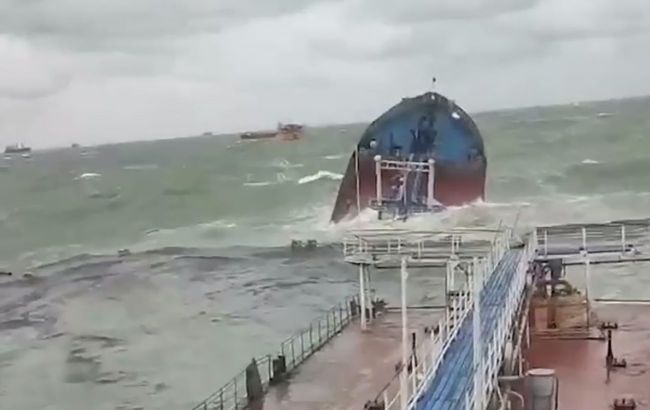Stricken tankers highlight risks of Russia's aging 'shadow fleet' – Reuters
 Photo: Volgoneft tankers suffered an accident in the Kerch Strait (video screenshot)
Photo: Volgoneft tankers suffered an accident in the Kerch Strait (video screenshot)
Two ageing tankers were damaged during a Kerch Strait storm, highlighting the environmental and insurance risks of Russia's 'shadow fleet', Reuters reports.
One crew member died when the vessel Volgoneft-212 split in half, while 12 people were rescued. Authorities stated that all 14 crew members aboard the vessel Volgoneft-239, which ran aground 80 meters from the shore near the port of Taman, were also rescued.
According to Russian news agency TASS, the ships, both over 50 years old, were carrying a total of around 9,200 metric tons of oil products, although the exact amount of the spill is still being determined.
As the certificates reviewed by Reuters claim, Volgoneft-212 was built in 1969 and Volgoneft-239 in 1973.
Risks of 'shadow fleet'
In recent months, the shipping industry has expressed concern about the risks and potential collisions posed by hundreds of 'shadow' tankers on open sea routes, as these vessels have no incentives to adhere to cleaner shipping standards.
Russia has increasingly relied on the 'shadow fleet,' employing various methods to bypass international sanctions.
The Kerch Strait, which separates mainland Russia from Crimea, which Moscow has temporarily occupied, is a key route for the export of grain and fuel products.
The Finland-based analytical center, Center for Research in Energy and Clean Air (CREA), reported that 369 vessels exported Russian crude oil and oil products last month, of which 206 were shadow tankers, and 28% were more than 20 years old.
Prior to the incidents over the weekend, CREA stated that the cost of cleaning up and compensating for oil spills from tankers with unknown or no insurance could exceed $1 billion for the coastal country's taxpayers.
Over the past year, the number of tankers carrying unregulated and uninsured cargoes has increased.
As Ukraine's Navy reported, Russian tankers with oil products began sinking near the Kerch Strait on December 15, having gone out to sea without complying with navigation requirements.

